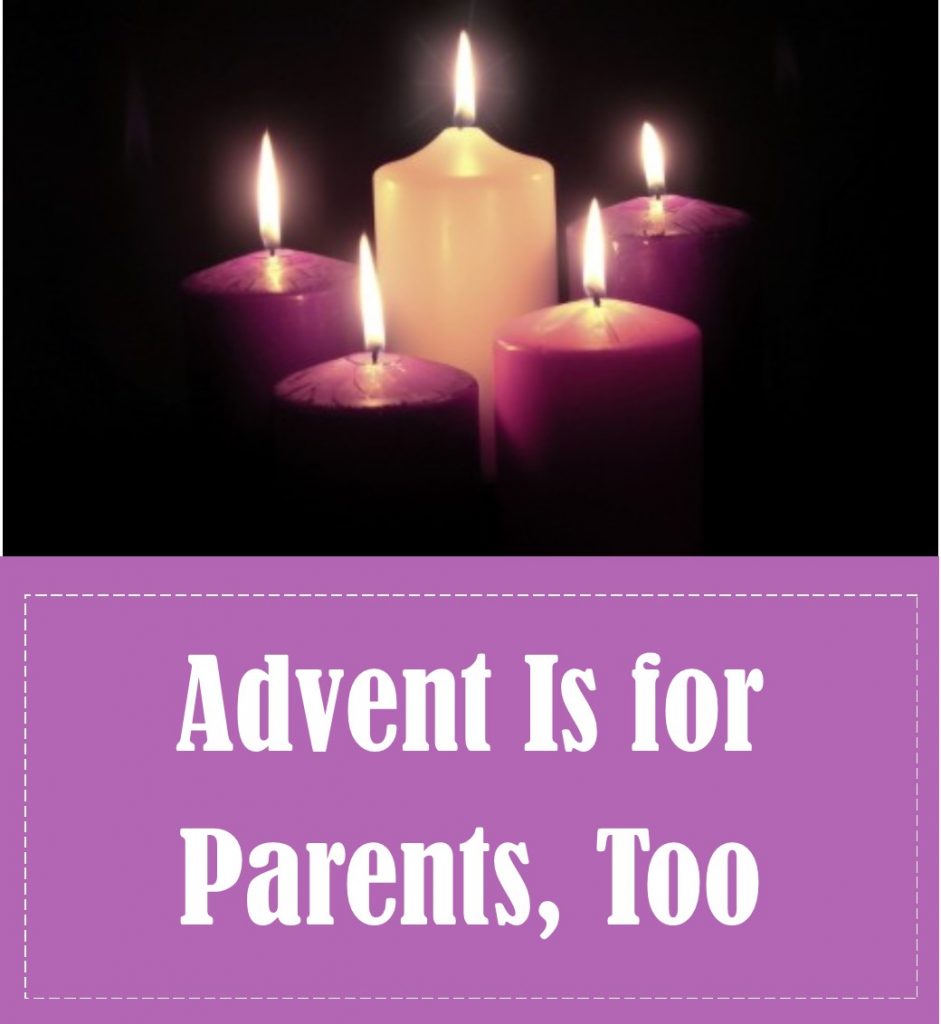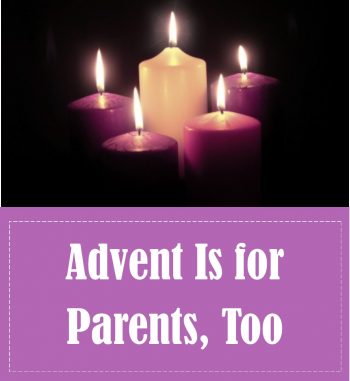
Before I was married and had children, the “Christmas” season wasn’t really on my radar (and Advent even less so). I saw Christmas as a welcome break between the fall and spring semesters in school, when I would reorganize my books, sleep in, maybe watch a movie or two with friends.
One Christmas break, my friend Sue and I were the only 2 students left on our college campus. The campus police knew we were there in our little dorm (an old farmhouse), all cozy under that snow-packed roof. We didn’t leave campus for the holidays because neither of us felt it was important, and we really didn’t have anywhere to go. But on Christmas Eve, Sue and I decided we should do something for Christmas, probably because the day arrived and we felt some sense of loss or loneliness even if we couldn’t admit it to ourselves.
So, we decorated a plant with ribbon to serve as a Christmas tree and we listened to Christmas music on Christmas day. I think we played games and made chicken for dinner. Then we went to bed. We got up the next day and returned to life as usual. Christmas had come and gone, and now we could get on with “real life”.
Now I have returned to the Faith. Now I am a wife and the mother of four children who daily — absolutely daily – help me recognize the Divine in the ordinary and the small gifts placed at my feet by a loving God who is interested in my life. Now I think about Christmas many weeks before Christmas Eve.
I embrace the Advent season with my family. I adore our Advent traditions: the baking, the Advent wreath, the Jesse Tree, the Advent teas, the music. I appreciate this liturgical pause when we reflect on why we believe in the Incarnation, and what it all means spiritually, historically, and personally. I understand it all a little better each year, and I always know I’ll recognize something new next year.
So, Advent is never the same from one year to the next, when we are paying attention. Each year, we awaken a little more to the life God hopes for us. And when you have children, our own gradual awakening mirrors our children’s: as they mature physically, intellectually, and spiritually, we are privileged to witness their own awakening. We are privileged to accompany them on that journey.
Enter the Chaos and Distractions!
This all sounds very lovely, but perhaps right now in the middle of Advent you have lost a sense of the central meaning of the season. Perhaps, you don’t recognize any of these graces in your Advent because you are too frazzled to notice anything other than your pinging phone! Perhaps you have become caught up in invitations, in the expectations of others on your time, in your own idealized vision of what Advent will be for your family.
When you have kids, your children’s energy, imagination, and anticipation are very consuming – of your time, energy, and even your bank account! (My girls think of more craft projects and homemade gift ideas than I can possibly manage!)
Remember that Advent is for parents, too. Our Advent is probably busier and more chaotic than the idyllic images we see in Catholic catalogs . . and mom blogs! Some of this craziness is unavoidable. However, I’ve discovered over the years that sometimes we get swept along in a wave of busy-ness because we are doing things out of habit or obligation, and not because they really lead us closer as a family or to Christ.
Smart Tips for a Sane Advent
I came across this article Lisa Popcak about how to make wise decisions about how to spend our time during Advent. I think they can help us “cut the fat” during Advent so we can find greater meaning and joy in the season. She suggests that we ask ourselves these four questions:
1. Do I enjoy this activity? Does it add to the joy of my holidays?
Good news: We can say no to some activities if we don’t enjoy them! If nobody in your family likes an event, and you’re just going out of a sense of obligation, maybe you can adjust that commitment in some way. Of course, sometimes we agree to activities not for our own enjoyment, but because we know it brings joy to others. We might visit the elderly in a nursing home for their sake, not our own. This is a beautiful lesson to communicate to our children. But there are other activities that really aren’t that important and nobody is really very blessed by them. For example, if your family has grown out of some of your traditions, it’s okay to start new ones!
2. Am I capable of doing it physically, financially, emotionally, or time wise?
Sometimes an Advent tradition or invitation really appeals to us, but for some reason it’s not realistic. Some of us can’t handle several parties in one day without becoming cranky. Some events are very expensive, so we have to make prudent decisions. Consider your unique family: what are wise choices given your strengths and limitations? If you try to fight against those limitations, you will become frustrated.
3. Is the holiday activity age/ability appropriate, both in skill level and ability to capture the meaning?
Here Lisa wisely counsels us to think about “kindness and sanity.” When considering an activity, ask yourself whether your children can understand and handle it. Some children aren’t mature enough to enjoy concerts, ballets, or other such experiences. While we may love midnight Mass, a toddler may be overwhelmed and truly incapable of managing it. There will be a day in the future when midnight Mass and the ballet are possible!
4. Does the activity give you time together to enjoy each other?
This is such a great point. Childhood memories are made in those things we do together each year, when we are all together as a family. We know that some Advent activities keep us apart as a family: choir practice, gift shopping, dance rehearsals. Some of these may be very valuable and important, and we may decide it’s worth it to take on these commitments. Perhaps we can balance these choices with focused time as a family: baking, crafting, and our own special family traditions.
I appreciated these reminders. Lisa’s tips can help all of us busy parents as we continue our own Advent journey this year. She’s right. The thing is, the chaotic days of family life are as grace-filled as the quiet(er) days. I admittedly find prayer and reflection easier during the quiet pauses, but when I offer my time and energy to create connections in my home, it is indeed a way to connect to God.
When we wake up on December 26, we may return to life as usual in some ways (but remember Christmas is longer than a day for Catholics!), but when we leave time during Advent for prayer, meaningful conversations, and activities that build connection in our families, we also return to our usual routines renewed and hopefully more aware of how God works and loves through our family’s work and love. God bless you!

